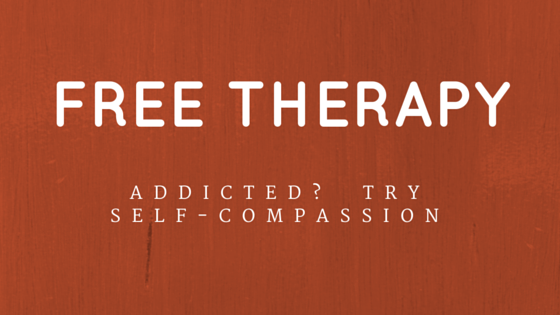
Multiple therapies can work together to overcome addiction. One of those therapies, which is free and can be used at any time, is self-compassion. While self-compassion by itself will not end an addiction, it is a useful tool for living a happier, healthier life and for changing the brain patterns associated with sexual addiction. Here, essentially, is what it is: treating yourself as you would treat a dear friend or loved one.
What would you do if your friend lost his job? What about if a significant other left him? Or what if he learned he had a debilitating disease? Would you chew him out or tell him that he shouldn’t feel bad? If he made a mistake, lost his temper, forgot something important, or wrecked the car, would you call him names and tell him he’s the only one in the world that does such things? Would you tell him over and over what a horrible or stupid person he is? Most likely, no.
Stop for a moment and think about what you would do.
Would you recognize how your friend might be feeling and feel some of his hurt yourself? Would you try to cheer him up? Would you remind him of the times he’s done things right or express confidence in his ability to get through the situation? Would you want him to be happy? This is compassion. When you feel and do these things for yourself, it is self-compassion.
The age-old adage, “If you can’t say something nice, don’t say anything at all” applies not only to how we speak of others, but also how we speak and think about ourselves. Just as we have healthier relationships with others as we extend compassion, mercy and grace, overlooking their faults and focusing on their strengths, so too can our relationships with ourselves improve as we forgive ourselves and highlight our own strengths and accomplishments.
Thus, one way to apply self-compassion in our own lives is to be aware of and intentionally modify how we talk and think about ourselves. Choose to think positively. Choose to speak positively.
This is not about being blind to what you are going through or pretending you aren’t feeling your emotions. Rather it is about choosing where to put your focus. For example, if you don’t want to get out of bed and you feel as though you no longer want to exist, but you get out of bed anyway, you could (A) berate yourself for how you feel, or (B) congratulate yourself for having the strength to get up when you don’t want to. (Or, if you didn’t get out of bed, you could (A) berate yourself for how you feel, or (B) congratulate yourself for at least recognizing that it is healthy and beneficial to get up.)
Besides verbally and mentally being self-compassionate, you may want to try journaling or writing yourself a letter. First, write down your negative feelings or thoughts. Then pretend that those are the feelings or thoughts of a best friend or loved one. When you’ve done this, write down your encouragement and support. Here are two examples:
I became angry at my son today and yelled at him. I know you didn’t want to yell at him. You’ve been working on that. And it’s been a week since you last yelled. That’s awesome. A lot of people have trouble controlling their temper. That’s not an excuse, but hopefully you realize that you’re not the only person trying to be better.
I’m not where I should be in life. My friends earn more money than I do and my debt’s getting bigger and bigger. It’s tough to be in debt. It is. And some of your classmates do earn more than you. But you earn more than some people. It really doesn’t matter how much you earn compared to other people. You know you need to learn to live within your means. Perhaps you can take a community education class on budgeting or personal finance.
In summary, whether you do it in your mind, speak it out loud, or write it down, pretend that you are talking or writing to your best friend and offer yourself compassion. Objectively empathize with how you are feeling, remind yourself that others go through hard times too, and help yourself see the positive aspects of the situation. Look for your own strengths and successes. Focus on offering yourself support.
If you want help overcoming your pornography addiction or sexual addiction, call Paradise Creek: (855) 442-1912.
